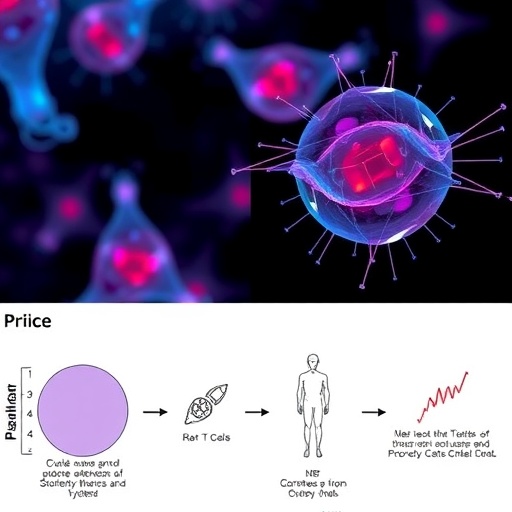
Recent advances in cancer immunotherapy have been revolutionized by the precise engineering of chimeric antigen receptor (CAR) T cells to deliver therapeutic payloads selectively within tumors. A groundbreaking study led by Chen et al. has demonstrated a novel approach that harnesses endogenous gene promoters to tightly control the expression of immunomodulatory cytokines, thus enhancing antitumor efficacy while mitigating systemic toxicity. Their work, published in Nature in 2025, showcases how rewiring native gene circuits inside human CAR T cells can lead to improved tumor infiltration, persistence, and effector functions without the dangers typically associated with cytokine therapies.
At the heart of this innovation is the targeting of the NR4A2 gene locus to drive IL-12 expression in CAR T cells. By engineering human anti-LeY CAR T cells to express IL-12 under the control of the NR4A2 promoter, the researchers observed a remarkable elevation in key cytokines such as interferon gamma (IFNγ), tumor necrosis factor (TNF), and interleukin-2 (IL-2) upon in vitro stimulation. This intracellular rewiring allowed the modified CAR T cells to expand robustly and maintain functionality, a feat that is critical for sustained antitumor activity.
In vivo experiments using OVCAR-3 xenograft models further underscored the therapeutic potential of NR4A2/IL-12 CAR T cells. These engineered cells mediated superior tumor regression compared to mock-edited counterparts and, strikingly, cured mice exhibited durable immunity against secondary tumor challenges. This phenomenon indicates that the rewired CAR T cells not only eradicate existing tumors but also contribute to long-lasting immunological memory, a vital component for preventing relapse.
.adsslot_HSUMEF7QqJ{width:728px !important;height:90px !important;}
@media(max-width:1199px){ .adsslot_HSUMEF7QqJ{width:468px !important;height:60px !important;}
}
@media(max-width:767px){ .adsslot_HSUMEF7QqJ{width:320px !important;height:50px !important;}
}
ADVERTISEMENT
Importantly, the NR4A2-driven IL-12 expression occurred without observable toxicities, setting these cells apart from previous CAR T models that utilized PD-1 locus editing for IL-12 delivery, which resulted in rapid weight loss and systemic adverse effects. This safety profile highlights the advantage of harnessing endogenous regulatory elements, which appear to limit cytokine expression to the tumor microenvironment, thereby avoiding harmful systemic exposure.
A closer examination of the tumor-infiltrating CD8+ CAR T cells revealed heightened expression of effector molecules including granzyme B and proliferative marker Ki67, confirming enhanced cytotoxic potential and proliferation. Transcriptomic analyses via RNA sequencing demonstrated that NR4A2/IL-12 CAR T cells distinctly upregulated gene pathways involved in IL-12 signaling, TNF-related cascades, and STAT family transcription factors (STAT3/4/5), underpinning their robust effector functions and persistence within the hostile tumor milieu.
While IL-12 proved highly effective when driven by NR4A2, the researchers probed whether a different cytokine could be similarly harnessed. Anti-LeY CAR T cells engineered to express IL-2 under the NR4A2 promoter only showed mild tumor control enhancements. This observation prompted exploration of the RGS16 promoter, a gene known to support stronger intratumoral transgene expression. Indeed, RGS16/IL-2 CAR T cells significantly outperformed NR4A2/IL-2 in tumor control and cytokine production, without eliciting toxicity.
Mechanistic studies on RGS16/IL-2 CAR T cells revealed elevated Ki67, IFNγ, and TNF expression alongside increased CD8+ and CD4+ CAR T cell frequencies in tumor, spleen, and peripheral blood. These data suggest that the promoter choice for therapeutic payloads must be carefully matched to the biological properties of the payload itself, balancing efficacy with safety to maximize clinical utility.
Extending their findings to an immunocompetent model, murine anti-hHer2 CAR T cells driven by the RGS16/IL-2 construct demonstrated strong therapeutic responses against E0771-hHer2 tumors without increasing the frequency of immunosuppressive regulatory T cells (Tregs) within the tumor. This result alleviates concerns about inadvertent immune dampening that could offset the benefits of cytokine secretion.
The researchers also validated these gene modulation strategies in patient-derived diffuse large B-cell lymphoma (DLBCL) CAR T cells. CRISPR-mediated knock-in of IL-12 or IL-2 reporter constructs into NR4A2 or RGS16 loci led to controlled cytokine expression after stimulation, confirming the approach’s translatability to human clinical contexts.
Importantly, comparison between traditional retroviral transduction methods and precise TRAC-targeted knock-ins underscored the superiority of endogenous gene rewiring. Knock-in CAR T cells exhibited regulated expression patterns and potent antitumor activity, affirming the promise of CRISPR-based genome editing in generating safer and more efficacious next-generation cell therapies.
This study’s findings open new horizons for reprogramming CAR T cells by integrating synthetic biology with deep understanding of endogenous gene regulation. By strategically repurposing native promoters like NR4A2 and RGS16, therapeutic payloads can now be precisely delivered within tumor sites, achieving potent antitumor immunity while minimizing systemic toxicity. This approach potentially lays the groundwork for a new class of “smart” CAR T therapies tailored for personalized cancer treatment.
With clinical translation in mind, these results highlight the need for further exploration of endogenous regulatory elements to control diverse cytokines or immunomodulators. Such advances could enable combinatorial payload delivery tailored to distinct tumor types or immune environments, leveraging the full arsenal of immune biology to eradicate refractory malignancies safely.
In summary, the engineered NR4A2/IL-12 and RGS16/IL-2 human CAR T cells represent a major breakthrough in immunotherapy design. Leveraging endogenous gene promoters to modulate therapeutic payload expression ushers in a new era of precision-engineered cell therapies with enhanced efficacy and safety profiles. The work by Chen and colleagues moves us closer to realizing the full potential of cellular immunotherapy against cancer.
Subject of Research: Engineering endogenous gene promoters in human CAR T cells to achieve tumor-restricted cytokine delivery for enhanced antitumor efficacy and reduced systemic toxicity.
Article Title: Rewiring endogenous genes in CAR T cells for tumour-restricted payload delivery.
Article References: Chen, A.X.Y., Yap, K.M., Kim, J.S. et al. Rewiring endogenous genes in CAR T cells for tumour-restricted payload delivery. Nature (2025). https://doi.org/10.1038/s41586-025-09212-7
Image Credits: AI Generated
Tags: antitumor efficacy enhancementcancer immunotherapy advancementsCAR-T Cell Therapycytokine therapy risksendogenous gene promoters in immunotherapyengineered T cell therapiesIL-12 expression in CAR T cellsNR4A2 gene locusOVCAR-3 xenograft modelssystemic toxicity mitigationtumor infiltration and persistencetumor-targeted immunotherapy





